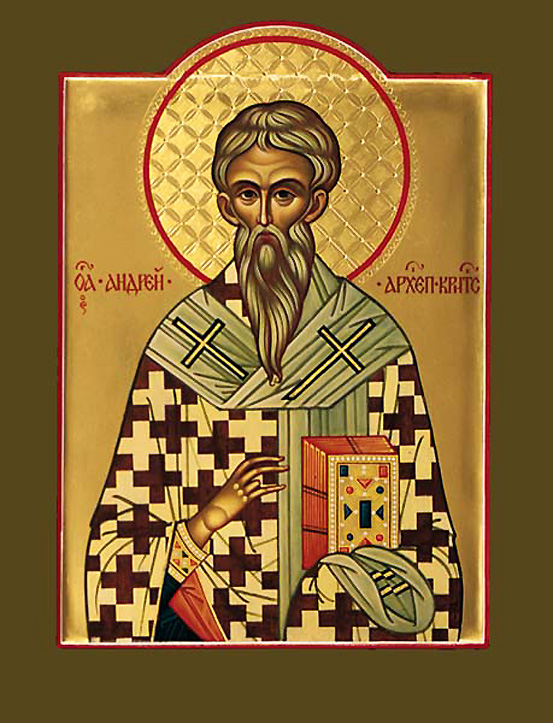
Saint Andrew, Archbishop of Crete, was born in the city of Damascus into a pious Christian family. Up until seven years of age the boy was mute and did not talk. However, after communing the Holy Mysteries of Christ he found the gift of speech and began to speak. And from that time the lad began earnestly to study Holy Scripture and the discipline of theology. At fourteen years of age he went off to Jerusalem and there he accepted monastic tonsure at the monastery of Saint Savva the Sanctified. Saint Andrew led a strict and chaste life, he was meek and abstinent, such that all were amazed at his virtue and reasoning of mind. As a man of talent and known for his virtuous life, over the passage of time he came to be numbered among the Jerusalem clergy and was appointed a secretary for the Patriarchate -- a writing clerk. In the year 680 the locum tenens of the Jerusalem Patriarchate, Theodore, included archdeacon Andrew among the representatives of the Holy City sent to the Sixth Ecumenical Council, and here the saint contended against heretical teachings, relying upon his profound knowledge of Orthodox doctrine. Shortly after the Council he was summoned back to Constantinople from Jerusalem and he was appointed archdeacon at the church of Hagia Sophia, the Wisdom of God. During the reign of the emperor Justinian II (685-695) Saint Andrew was ordained bishop of the city of Gortineia on the island of Crete. In his new position he shone forth as a true luminary of the Church, a great hierarch -- a theologian, teacher and hymnographer. Saint Andrew composed many inspired writings present in the Eastern liturgy, including the Great Canon of Repentance as well as the Canon for the Feast of the Nativity of Christ, three Odes for Compline of Palm Sunday, and also in the first four days of Passion Week, as well as verses for the Feast of the Meeting of the Lord, and many other Church hymns. Church historians are not of the same opinion as to the date of death of the saint. One suggests the year 712, while others -- the year 726. He died on the island of Mytilene, while returning to Crete from Constantinople, where he had been on churchly business. His relics were transferred to Constantinople. In the year 1350 the pious Russian pilgrim Stephen Novgorodets saw the relics at the Constantinople monastery named for Saint Andrew of Crete.
https://www.oca.org/saints/lives/2022/07/04/101894-saint-andrew-archbishop-of-crete
For this very reason, Christ died and returned to life so that he might be the Lord of both the dead and the living. You, then, why do you judge your brother or sister[a]? Or why do you treat them with contempt? For we will all stand before God’s judgment seat. It is written: “‘As surely as I live,’ says the Lord, ‘every knee will bow before me, every tongue will acknowledge God.’” So then, each of us will give an account of ourselves to God. Therefore let us stop passing judgment on one another. Instead, make up your mind not to put any stumbling block or obstacle in the way of a brother or sister. I am convinced, being fully persuaded in the Lord Jesus, that nothing is unclean in itself. But if anyone regards something as unclean, then for that person it is unclean. If your brother or sister is distressed because of what you eat, you are no longer acting in love. Do not by your eating destroy someone for whom Christ died. Therefore do not let what you know is good be spoken of as evil. For the kingdom of God is not a matter of eating and drinking, but of righteousness, peace and joy in the Holy Spirit, because anyone who serves Christ in this way is pleasing to God and receives human approval.
(Irmos) A Helper and Protector has become salvation to me. This is my God; I will glorify Him. God of my fathers, I will exalt Him; for in glory has He been glorified!
Glory to You, our God, glory to You!
Where shall I begin to lament the deeds of my wretched life? What first-fruits shall I offer, O Christ, for my present lamentation? But in your compassion, grant me release from my sins.
Come, wretched soul, with your flesh confess to the Creator of All. In future, refrain from your former brutishness and offer to God tears in repentance.
Having rivaled the first-made Adam in my transgressions, I realize that I am stripped naked of God and of the everlasting kingdom of bliss through my sins.
Alas, wretched soul! Why are you like the first Eve? For you have wickedly looked and been bitterly wounded, and you have touched the tree and rashly tasted the forbidden fruit. (cf Gen. 3:6)
The place of bodily Eve has been taken by the Eve of my mind, in the shape of a passionate thought in the flesh, showing me sweet things yet ever making me taste bitter things.
Adam was rightly exiled from Eden for not keeping Your one commandment. O Savior, what shall I suffer, who am always rejecting Your living words? (cf Gen. 3:26/Acts 7:38)
Glory to the Father and to the Son and to the Holy Spirit!
Trinity adored in Unity, take from me the heavy yoke of sin, and in Your compassion, grant me tears of compunction. Now and ever and forever. Amen.
O Theotokos, hope and intercessor of those who sing to you, take from me the heavy yoke of sin, and as you are our pure Lady, accept me that repents.
(KATAVASIA) A Helper and a Protector is He unto salvation. He is my God, and I glorify Him; God of my fathers, and I magnify Him, for He is greatly glorified.
Troparion and Kontakion